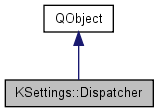KUtils
KSettings::Dispatcher Class Reference
[Settings UI classes]
Dispatch change notifications from the KCMs to the program.
More...
#include <dispatcher.h>

Public Slots | |
| void | reparseConfiguration (const QCString &instanceName) |
| void | syncConfiguration () |
Public Member Functions | |
| KConfig * | configForInstanceName (const QCString &instanceName) |
| QStrList | instanceNames () const |
| void | registerInstance (KInstance *instance, QObject *recv, const char *slot) |
Static Public Member Functions | |
| static Dispatcher * | self () |
Detailed Description
Dispatch change notifications from the KCMs to the program.Since your program does not have direct control over the KCMs that get loaded into the KConfigureDialog you need a way to get notified. This is what you do:
Dispatcher::self()->registerInstance( instance(), this, SLOT( loadSettings() ) );
- Since:
- 3.2
Definition at line 51 of file dispatcher.h.
Member Function Documentation
- Returns:
- the KConfig object that belongs to the instanceName
Definition at line 86 of file dispatcher.cpp.
| QStrList KSettings::Dispatcher::instanceNames | ( | ) | const |
- Returns:
- a list of all the instance names that are currently registered
Definition at line 100 of file dispatcher.cpp.
| void KSettings::Dispatcher::registerInstance | ( | KInstance * | instance, | |
| QObject * | recv, | |||
| const char * | slot | |||
| ) |
Register a slot to be called when the configuration for the instance has changed.
instance is the KInstance object that is passed to KGenericFactory (if it is used). You can query it with KGenericFactory<YourClassName>::instance(). instance->instanceName() is also the same name that is put into the .desktop file of the KCMs for the X-KDE-ParentComponents.
- Parameters:
-
instance The KInstance object recv The object that should receive the signal slot The slot to be called: SLOT( slotName() )
Definition at line 61 of file dispatcher.cpp.
| void KSettings::Dispatcher::reparseConfiguration | ( | const QCString & | instanceName | ) | [slot] |
Call this slot when the configuration belonging to the associated instance name has changed.
The registered slot will be called.
- Parameters:
-
instanceName The value of X-KDE-ParentComponents.
Definition at line 110 of file dispatcher.cpp.
| Dispatcher * KSettings::Dispatcher::self | ( | ) | [static] |
| void KSettings::Dispatcher::syncConfiguration | ( | ) | [slot] |
When this slot is called the KConfig objects of all the registered instances are sync()ed.
This is usefull when some other KConfig objects will read/write from/to the same config file, so that you can first write out the current state of the KConfig objects.
Definition at line 127 of file dispatcher.cpp.
The documentation for this class was generated from the following files:
 KDE 3.5 API Reference
KDE 3.5 API Reference